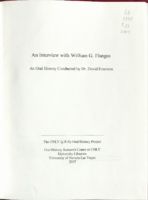Search the Special Collections and Archives Portal
Search Results

Transcript of interview with Gordon Christie by Larry DuRussel, June 30, 1975
Date
Archival Collection
Description
On June 30, 1975, Larry DuRussel interviewed carpenter Gordon Christie, (born March 9th, 1916 in Grand Rapids, Michigan) at his home in Las Vegas, Nevada. During this interview Gordon discusses having worked on the building of the MGM, Fremont Downtown, the Sahara Hotel, Desert Inn, and the Frontier Hotel, amongst others. Before becoming a carpenter, Gordon recalls working with his father at a furniture factory. He also discusses religion, politics, family life and the growth of Las Vegas.
Text

Transcript of interview with Horace Emery by Barry Sarles, March 2, 1980
Date
Description
On March 2, 1980, Barry Sarles interviewed river boatman and dam worker, Horace Emery (born 1911 in California) at his older brother’s farm in Nelson, Nevada. This interview covers the local area around Nelson and the early events that helped shape the area. Also present during the interview, Barry Sarles’s girlfriend, Diane Dobaj and Horace’s older brother, Merl Emery. Mr. Sarles also discusses his work as a river boatman on the Colorado River, working on the Hoover and Davis Dams, and employment as a factory worker in Clark County.
Text

Transcript of interview with William Carlson by Alice Brown, March 19, 1980
Date
Archival Collection
Description
Text

Transcript of interview with William G. Flangas by Dr. David Emerson, September 27, 2006
Date
Archival Collection
Description
Text
UNLV University Libraries Collection on Nevada Mining
Identifier
Abstract
The Nevada Mining Collection is comprised of records that document mining and mines in Nevada from 1842 to 1966. The majority of the collection includes records of various mines and mining companies located in the Esmeralda, Lincoln, Clark, White Pine, and Nye counties, dating from 1900 to 1928. The collection includes financial, administrative, and business related records; photographs of miners, mining camps, and towns; correspondence; maps; newspaper clippings, pamphlets, newsletters, and booklets.
Archival Collection

Transcript of interview with Laura Kelly by Cindy Gaylor, February 27, 1979
Date
Archival Collection
Description
On February 27, 1979, Cindy Gaylor interviewed engineering aid accountant, Laura Kelly (born December 31st, 1928 in Silverton, Colorado) in her home in Boulder City, Nevada. The two discuss Kelly’s reasons for moving, as well as her early life in Boulder City. They also discuss Nellis Air Force Base, as well as local politics. The interview concludes with a discussion of the Civilian Conservation Corps (CCC) in Southern Nevada, during the Great Depression.
Text

Transcript of interview with Mary Kreuzer by Patricia Kohlman, December 15, 1975
Date
Archival Collection
Description
On December 15, 1975, Patricia Kohlman interviewed Mary Kreuzer (born 1923 in Las Vegas, Nevada) in her home in Las Vegas. The two discuss Kreuzer’s childhood, as well as the different addresses that she’s lived at in Las Vegas. The interview concludes with a discussion on entertainment and small businesses before the population boom in Southern Nevada.
Text

Transcript of interview with Sigrid Capel by Michael McKenna, February 10, 1980
Date
Description
Text

Laura Gentry interview, February 26, 1977: transcript
Date
Archival Collection
Description
On February 26, 1977, collector Harold May interviewed Laura Gentry (born May 1897 in St. Thomas, Nevada) at her cabin in Gold Butte, Nevada. In this interview, Laura Gentry discusses living in St. Thomas and Overton, Nevada. She discusses the development of the Overton and Gold Butte areas of Nevada as well as the people involved in mining in these areas.
Text

Transcript of interview with Bunny Harris by Kenneth Young, February 28, 1979
Date
Description
On February 28, 1979, collector Kenneth P. Young interviewed office manager and real estate broker, Mrs. Bunny Harris (born November 21st, 1920 in Snyder, Texas) in her home in Las Vegas, Nevada. This interview offers an overview of the history of Las Vegas, including transportation, mining, farming, ranching, and housing. During the interview, Mrs. Bunny Harris discusses the Elks Club, Cashman Field, McCarran Airport, Howard Hughes and Nellis Air Force Base.
Text
